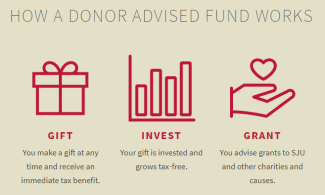
Donor Advised Funds: How to Donate Tax-Efficiently
Donor Advised Funds: How to Donate Tax-Efficiently
While the typical purpose of donating is for altruistic reasons, individuals can take advantage of donations in the form of an itemized deduction when filing a tax return. However, the Tax Cut and Jobs Act (TCJA) of 2017 made it difficult to itemize deductions given the massive increase to the standard deduction. While charitable donations can still be made, there is little to no tax advantage unless the sum of itemized deductions are over the standard deduction ($24,800 for married filing jointly, $12,400 for single). In recent years, donor advised funds have become a popular option that can accomplish two goals: Making a charitable donation and receiving a tax deduction. Below we go over how a donor advised fund works.
Donor Advised Funds (DAF) Contributions
Under a DAF’s structure, charitable donations that would otherwise be made in the span of multiple tax years can be bundled up in one year and contributed to a DAF. Once the contribution is made, you can take an immediate itemized deduction for this bundled contribution.
While you can contribute in the form of cash, stock, real estate, etc., one of the more popular sources of contributions are highly appreciated assets. In doing so, you can eliminate the consequence of selling the asset and paying any potential capital gain taxes. One thing to keep in mind is that this contribution is irrevocable. The funds cannot be used for any other purpose other than granting it to charities.
Growing the Donation
Once the contribution is made, donor advised funds function like a charitable investment account. The contributions can be invested and grow tax-free before they are distributed to your charities of choice.
Supporting Charities Over Time
Once the DAF is setup, funded, and invested, you can distribute to charities at your discretion. While there is no annual requirement to distribute funds, any distribution made must go to an IRS-qualified charity. The IRS provides a database where you can verify if a charity you intend to give to is qualified for a distribution.
Conclusion
The decision to setup a donor advised funds is dependent on a case-by-case basis. Typically, high-earning individuals with charitable inclinations may want to consider this as they will most likely have the cash flow to make large lump-sum contributions. It is highly recommended to consult with a fee-only financial advisor to see if a donor advised fund works for you.
Weingarten Associates is an independent, fee-only Registered Investment Advisor in Lawrenceville, New Jersey serving Princeton, NJ as well as the Greater Mercer County/Bucks County region. We make a difference in the lives of our clients by providing them with exceptional financial planning, investment management, and tax advice.

